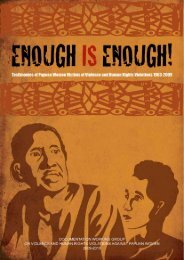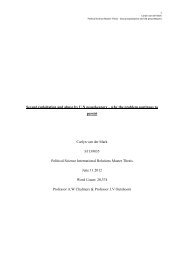The Impact of Armed Conflict on Women and Girls - UNFPA
The Impact of Armed Conflict on Women and Girls - UNFPA
The Impact of Armed Conflict on Women and Girls - UNFPA
Create successful ePaper yourself
Turn your PDF publications into a flip-book with our unique Google optimized e-Paper software.
violence interc<strong>on</strong>nect are not yet established; however, increasingly violent<br />
attitudes in the regi<strong>on</strong> are apparent.<br />
Reproductive Health Issues <strong>and</strong> the Society<br />
Neither the issue <str<strong>on</strong>g>of</str<strong>on</strong>g> violence nor the reproductive health <str<strong>on</strong>g>of</str<strong>on</strong>g> women is<br />
publicly addressed in post-c<strong>on</strong>flict societies. <str<strong>on</strong>g>The</str<strong>on</strong>g>y fail to be addressed in both<br />
society <strong>and</strong> the family. With the internati<strong>on</strong>al community focusing <strong>on</strong> the Balkans,<br />
issues <str<strong>on</strong>g>of</str<strong>on</strong>g> violence <strong>and</strong> reproductive health are being seriously c<strong>on</strong>sidered to<br />
benefit their populati<strong>on</strong>s.<br />
Post-c<strong>on</strong>flict regi<strong>on</strong>s struggle with the exacerbati<strong>on</strong> <str<strong>on</strong>g>of</str<strong>on</strong>g> issues such as<br />
impoverishment, especially when damage occurs to the productive infrastructure.<br />
Also included am<strong>on</strong>g the struggles in post-c<strong>on</strong>flict settings are transiti<strong>on</strong>s from a<br />
planned ec<strong>on</strong>omy to a market ec<strong>on</strong>omy, exemplified by negative influences such<br />
as the sex trade, severe internal ethnic divisi<strong>on</strong>s, <strong>and</strong> political discourse based<br />
<strong>on</strong> nati<strong>on</strong>alistic assumpti<strong>on</strong>s. Each has a pr<str<strong>on</strong>g>of</str<strong>on</strong>g>ound impact <strong>on</strong> the populati<strong>on</strong>’s<br />
health. During the c<strong>on</strong>flict, women <strong>and</strong> children were vulnerable to several<br />
hardships in the post-c<strong>on</strong>flict setting. Insufficient reproductive health educati<strong>on</strong>,<br />
inadequate informati<strong>on</strong> <strong>on</strong> c<strong>on</strong>traceptives <strong>and</strong> unequal access to them, taboo<br />
attitudes regarding human sexuality, low quality reproductive health services,<br />
uneven distributi<strong>on</strong> <str<strong>on</strong>g>of</str<strong>on</strong>g> those services, the dearth <str<strong>on</strong>g>of</str<strong>on</strong>g> modern diagnostic facilities<br />
<strong>and</strong> widespread n<strong>on</strong>-medical aborti<strong>on</strong>s (in lieu <str<strong>on</strong>g>of</str<strong>on</strong>g> available birth c<strong>on</strong>trol methods)<br />
are comm<strong>on</strong> problems, <strong>on</strong>es that have serious ramificati<strong>on</strong>s for women’s health.<br />
HIV/AIDS <strong>and</strong> other STDs <strong>and</strong> STIs are seldom tracked or recorded. Services<br />
struggle to manage the pre-war quantity <strong>and</strong> quality level <str<strong>on</strong>g>of</str<strong>on</strong>g> their health facilities.<br />
Domestic Violence in Bosnia <strong>and</strong> Herzegovina<br />
A joke in Bosnia <strong>and</strong> Herzegovina proceeds like this: One man asks<br />
another, “Did you beat up your wife last night?” <str<strong>on</strong>g>The</str<strong>on</strong>g> other replies, “No, I didn’t,<br />
she did not do anything wr<strong>on</strong>g yesterday.” <str<strong>on</strong>g>The</str<strong>on</strong>g> first replies: “All the same, you<br />
should see that she does not forget who is boss in the house.” This joke reveals<br />
comm<strong>on</strong> attitudes held by many men <strong>and</strong> women in the regi<strong>on</strong> that reinforce<br />
male power in family structures. <str<strong>on</strong>g>The</str<strong>on</strong>g> joke also bolsters the noti<strong>on</strong> that men are<br />
violent <strong>and</strong> women are oppressed.<br />
Family violence is not new or rare in Bosnian <strong>and</strong> Herzegovinian society.<br />
Violence against women did not start with the war. It was always present but<br />
hidden from public awareness <strong>and</strong>, therefore, not addressed. It c<strong>on</strong>tinues to be<br />
an issue comm<strong>on</strong>ly neglected by society. Several studies <strong>on</strong> family violence in<br />
Sarajevo reflect male participati<strong>on</strong>, but their answers are not elaborated in the<br />
analysis. In 2000, <strong>Women</strong> to <strong>Women</strong>, an active NGO in Bosnia <strong>and</strong><br />
Herzegovina, c<strong>on</strong>ducted a survey <strong>on</strong> violence against women in Sarajevo. Only<br />
24 per cent <str<strong>on</strong>g>of</str<strong>on</strong>g> 160 resp<strong>on</strong>dents were men. <str<strong>on</strong>g>The</str<strong>on</strong>g> reas<strong>on</strong> for such low male<br />
involvement was reportedly because most men who had been asked to<br />
66




![IANSA [PDF, 2MB] - PeaceWomen](https://img.yumpu.com/25206379/1/190x123/iansa-pdf-2mb-peacewomen.jpg?quality=85)
![Commitments Sample [PDF, 93KB] - PeaceWomen](https://img.yumpu.com/25206331/1/190x245/commitments-sample-pdf-93kb-peacewomen.jpg?quality=85)










![A Toolkit for Advocacy and Action [PDF, 260KB] - Peace Women](https://img.yumpu.com/25205989/1/190x245/a-toolkit-for-advocacy-and-action-pdf-260kb-peace-women.jpg?quality=85)